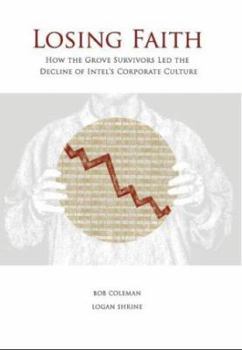Losing Faith: How the Grove Survivors Led the Decline of Intel's Corporate Culture
What has happened to Andy Grove's Intel? A Wall Street Journal article dated November 1, 2006 stated that Andy Grove "won't talk about current goings on at Intel. He does, though, talk about its past... This description may be from another edition of this product.
Format:Hardcover
Language:English
ISBN:0979168104
ISBN13:9780979168109
Release Date:January 2007
Publisher:Losing-Faith.Com
Length:210 Pages
Weight:1.10 lbs.
Dimensions:9.0" x 1.0" x 6.3"
Customer Reviews
3 ratings
You Reap What You Sow
Published by Thriftbooks.com User , 16 years ago
This is a good read regarding the decline of the Intel Corporation. The book is based primarily upon the complaint that the corporation's employees are not held accountable for their actions and failures, especially when the actions are not in compliance with the corporation's own written codes of conduct and behavior. The authors attack the typical band-aide approach to many of the corporation's problems (which are primarily outside the technical fields of microprocessors, and deal with the supply and customer service side of the corporation). The book targets Andy Groves successors as CEO and Chairman of the Board -- their managerial style, lack of technical expertise in particular, and lack of involvement on a more personal level. The book addresses the culture of those employees who survived the Grove tenure and their attitude of "entitledness" and the discord between these survivors and more recent employees. The book addresses a form of "careerism" (my term, not the authors)among the established managers. The authors criticism sounds a lot like the criticism found in some books about the Army officers "ticket punching" during the Vietnam era -- heck, it sounds a lot like the successfully promoted folks at the hospital where I work. The authors play with kid gloves when the subject of Andy Grove comes up. They only more than hint that his "in-your-face" management style directly contributed to Intel's decline. They do not even discuss the Pentium debacle under Grove and the public relations disaster that ensued. The authors also lightly touch upon the technical competence and backgrounds of Grove's successors, and this is important since they are not the technical geniuses that founded or nurtured Intel (Noyce, Moore, and Groves)-- most of their experience is not discussed but it is in marketing and other non-technical fields. This is another good book discussing the ills of big corporations that lose their way in a fast changing world and fail to keep pace, especially after a level of arrogance rises within the corporation -- is Intel falling from its lofty heights just like IBM did -- is Microsoft not far behind. Stock holders should look closely at the trend of mis-management and the subsequent loss of billions of dollars (especially in bad acquistions and lack of overall business planning) that could have been paid out in dividends. Stockholders should hold the board of directors more responsible for rubber stamping poor CEO and chairman of the board's decisions/performance and not holding them more accountable.
Probably Accurate but Unsubstantiated
Published by Thriftbooks.com User , 17 years ago
This book focuses on many facets of Intel's operations and behaviors, from the annual employee review process (focal) to the company's poorly-executed acquisitions. It's an interesting read, particularly for a (former or current) employee, contractor (Green Badge), or vendor. That being said, there was a fair amount in this book that was based on conjecture and anonymous quotes. Perhaps that's a necessary evil, but I tend to mistrust quotes offered by people who want to remain anonymous. Several parts of the book left me feeling like it was a seedy exposé rather than a critical assessment of the corporation. My other criticism is that it seemed the book, throughout, was holding adherence to the Intel Values as the corporate marker of success (with every chapter presenting a comparison of the stated values and the actual behaviors). If that was the intent, I reject its validity. A positive and strong culture often has a good impact on the balance sheet and overall success, but that doesn't mean that if individual actions don't conform to stated values that it's "wrong." Maybe it's the Values that need to change. On the up side, I think this may have been as balanced as it could be, given it was written by (former?) employees. Personally, I'd agree with many of the descriptions of corporate jockeying for recognition, co-opting ideas, and "grabbing the glory" and run. That being said, individual mileage may vary and I'm sure the opinions about this book and Intel itself are as varied as there are employees (and stockholders).
They tell it like it is!
Published by Thriftbooks.com User , 17 years ago
Based on my 18 years at Intel ('79-'97), the authors do an excellent job of accurately describing the Intel culture throughout Intel's 38 year history. They explain the good and the bad and the ugly. This book can be a wakeup call for Intel and all of its employees and shareholders. The abuse of power during the Grove era comes with a price (what goes around, comes around). The advice that the authors provide is right on!





